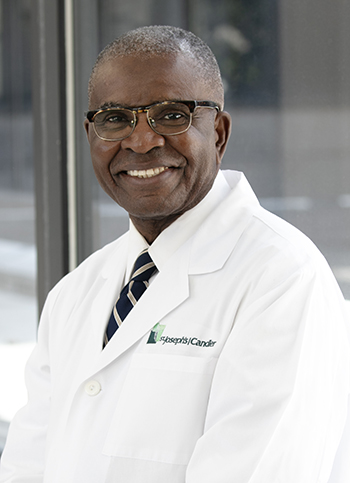What causes high blood pressure?
Heart Health
Primary Care Physician Dr. Eugene Nwosu explains the good and bad about hypertension
If you had a condition that could potentially lead to heart failure, a heart attack or stroke, wouldn’t you want to do something about it? Well, if that condition is high blood pressure, also known as hypertension, the good news is you can do something about it.
But it also comes with bad news.
“Hypertension is a very common medical problem, and the thing about it is it’s silent. The majority of people don’t have symptoms,” says Dr. Eugene Nwosu, internal medicine physician at St. Joseph’s/Candler Primary Care located on Eisenhower Drive. Dr. Nwosu was a cardiologist in Savannah for 25 years prior.
“They have no clue they have high blood pressure. That is the bad thing about it,” Dr. Nwosu continues.

But again, it’s not all bad, especially when you take control of your health.
“When people know they have high blood pressure, and they embrace lifestyle changes and follow those changes, it might be all you need to lower your blood pressure. Or, if you still aren’t reaching your goal but are embracing lifestyle changes then just one or two medications can help.”
What is high blood pressure?
Blood pressure is the force of blood pushing against the artery walls. The force is created with each heartbeat as blood is pumped through the arteries. Our arteries carry blood from the heart to other organs.
When you have your blood pressure checked, the reading comes back as two numbers: systolic and diastolic, explains Dr. Nwosu.
The top number, or systolic pressure, is the amount of pressure in your arteries when your heart muscle is contracting, forcing blood through your circulatory system.
The bottom number, or diastolic pressure, is the amount of pressure in your arteries when your heart is at rest, between beats.
Both numbers are important in determining whether your blood pressure is at a healthy level. The definition of high blood pressure has changed over the years, Dr. Nwosu says. Currently, a normal blood pressure is a top number of less than 120 and a bottom number of less than 80.
Pre-hypertension, or elevated blood pressure, is defined when the top number is between 120-129 and the bottom one is less than 80. Your blood pressure is considered stage one hypertension when the top number is between 130-139 and the bottom number is 80 to 89. Stage two is anything higher than that.
“Even at pre-hypertension levels, your arteries are getting narrow because high blood pressure causes arteriosclerosis, which is the narrowing of the lumen of the arteries,” Dr. Nwosu says
(The lumen is the hollow passageway through which blood flows.)
What causes high blood pressure?
There are many contributing factors contributing to high blood pressure. Dr. Nwosu shares some pretty interesting numbers:
- Excessive salt intake is responsible for 32 percent of high blood pressure diagnosis. Too much salt causes fluid retention and swelling, which increases your blood pressure.
- 18 percent of high blood pressure cases are due to low potassium, meaning people are not eating enough fruits and vegetables.
- Another 32 percent of diagnosis are due to obesity.
- Another 18 percent of cases are due to lack of physical activity. Get off the couch, Dr. Nwosu advises.
Other risk factors include:
- Family history
- Excessive alcohol intake
- Smoking
- Diabetes
- Abnormal cholesterol
- Being African-American
- Stress
Some more interesting numbers for you: In 20 percent of people diagnosed with high blood pressure, that is their only diagnosed condition. That means the other 80 percent of people already have a pre-existing condition, such as obesity, glucose intolerance, abnormal cholesterol, hypertrophy (thickening heart muscle) or elevated uric acid.
“So because you have high blood pressure, that might not be your only problem,” Dr. Nwosu says. “That’s why it’s important to see your primary care physician or cardiologist to look for these conditions and work together to reduce your risk.”
What are the symptoms of high blood pressure?
The No. 1 sign of high blood pressure is no symptoms, Dr. Nwosu says. However, some people do experience some symptoms that could indicate high blood pressure and you should go see your primary care doctor for. These include:
- Headache that won’t go away
- Nosebleeds
- Excessive sweating
- Excessive urination
- Fatigue
- Shortness of breath
- Leg swelling
- Dizziness
- Heart palpitations
- Convulsions
- Visual problems
- Vomiting
- Anxiety, unable to sleep
These symptoms and treating high blood pressure, even if it’s “only” elevated, should not be ignored or taken lightly. Uncontrolled hypertension can lead to a variety of complications including kidney disease, osteoporosis, heart attack, heart failure, cardiac arrest, aortic aneurysm and stroke, Dr. Nwosu says.
If it’s time for you to have your blood pressure checked through an annual wellness visit, make an appointment with one of our many St. Joseph’s/Candler Primary Care physicians located across the region.
Coming Thursday
We’ve said it’s not all bad when you are diagnosed with high blood pressure. You can take steps to lower your blood pressure and maybe even reverse it. We discuss those steps and the importance of controlling hypertension in the next Living Smart blog.